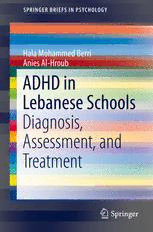
ADHD in Lebanese Schools: Diagnosis, Assessment, and Treatment PDF
Preview ADHD in Lebanese Schools: Diagnosis, Assessment, and Treatment
SPRINGER BRIEFS IN PSYCHOLOGY Hala Mohammed Berri Anies Al-Hroub ADHD in Lebanese Schools Diagnosis, Assessment, and Treatment 123 SpringerBriefs in Psychology SpringerBriefs in School Psychology More information about this series at h ttp://www.springer.com/series/10143 Hala Mohammed Berri (cid:129) Anies Al-Hroub ADHD in Lebanese Schools Diagnosis, Assessment, and Treatment Hala Mohammed Berri Anies Al-Hroub Department of Education Department of Education American University of Beirut American University of Beirut Beirut , Lebanon Beirut , Lebanon ISSN 2192-8363 ISSN 2192-8371 (electronic) SpringerBriefs in Psychology ISBN 978-3-319-28698-3 ISBN 978-3-319-28700-3 (eBook) DOI 10.1007/978-3-319-28700-3 Library of Congress Control Number: 2016931325 Springer Cham Heidelberg New York Dordrecht London © Springer International Publishing Switzerland 2016 T his work is subject to copyright. All rights are reserved by the Publisher, whether the whole or part of the material is concerned, specifi cally the rights of translation, reprinting, reuse of illustrations, recitation, broadcasting, reproduction on microfi lms or in any other physical way, and transmission or information storage and retrieval, electronic adaptation, computer software, or by similar or dissimilar methodology now known or hereafter developed. T he use of general descriptive names, registered names, trademarks, service marks, etc. in this publication does not imply, even in the absence of a specifi c statement, that such names are exempt from the relevant protective laws and regulations and therefore free for general use. T he publisher, the authors and the editors are safe to assume that the advice and information in this book are believed to be true and accurate at the date of publication. Neither the publisher nor the authors or the editors give a warranty, express or implied, with respect to the material contained herein or for any errors or omissions that may have been made. Printed on acid-free paper S pringer International Publishing AG Switzerland is part of Springer Science+Business Media (www.springer.com) For my parents and family Hala Mohamad Berri For all my graduate students Anies Al - Hroub Pref ace T his new book brings together the latest research about attention defi cit hyperac- tivity disorder (ADHD) in Lebanon. It specifi cally addresses issues related to assessing, diagnosing, and treating students with ADHD in Lebanese schools. The book is primarily written for teachers, counselors, principals, and research- ers. It also addresses specialists who are working with children with ADHD and special educational needs. The structure of chapters addresses what teachers and practitioners should do when dealing with issues related to ADHD. Chapter 1 introduces the concept of ADHD and the types of diffi culty which children with the disorder experience at school. The aims, rationale, and signifi cance of the research study on which this book is based are outlined. In Chap. 2 we discuss how the concept of ADHD has evolved over time and then move on to an examination of the prevalence, causes, diagnosis, and treatment of the disorder. In addition, we look at teachers’ knowl- edge and perceptions of ADHD. We then describe in Chap. 3 the research study that we undertook and how we set about answering our two research questions, which aimed to investigate Lebanese elementary school teachers’ knowledge of ADHD and how the gender of students with the disorder affects teachers’ perceptions of ADHD subtypes. The research fi ndings are presented in Chap. 4 , and we discuss teachers’ general knowledge about ADHD as well as their understanding of the symptoms, diagnosis, and treatment of the condition. In addition we provide an overview of ADHD in the specifi c context of Lebanon. Chapter 5 concludes the book with a discussion of what constitutes teacher’s knowledge and perceptions of ADHD and the need for training to be provided for teachers and services to be offered to students. We consider the implications of the research and make recom- mendations for strategies that will benefi t both students and teachers alike. Beirut, Lebanon Hala Mohammed Berri Anies Al-Hroub vii Contents 1 Introduction to ADHD ................................................................................ 1 1.1 Introduction .......................................................................................... 1 1.2 Discovering What Lebanese Teachers Know About ADHD ............... 3 1.3 Why Study ADHD in Lebanon? .......................................................... 3 1.4 Addressing the Diffi culties in Educating Students with ADHD .......... 5 References ..................................................................................................... 5 2 Assessment, Diagnosis, and Treatment of ADHD in School-Aged Children ............................................................................ 7 2.1 Conceptions of ADHD ......................................................................... 7 2.1.1 Evolving Conceptions of ADHD ............................................. 7 2.1.2 Current Defi nition of ADHD ................................................... 8 2.2 Overview of ADHD ............................................................................. 8 2.2.1 Prevalence of ADHD and Gender Factors ............................... 8 2.2.2 Prevalence of ADHD Across Cultures ..................................... 9 2.2.3 Causes of ADHD ..................................................................... 9 2.2.4 Genetic and/or Psychosocial Causes of ADHD ....................... 10 2.2.5 Diagnosis of ADHD ................................................................. 11 2.2.6 Assessment of ADHD .............................................................. 12 2.2.7 Intervention and Treatment ...................................................... 13 2.3 Teachers’ Knowledge of ADHD .......................................................... 13 2.3.1 Factors Affecting Teachers’ Knowledge .................................. 14 2.4 Gender of Students with ADHD and Teachers’ Perceptions ............... 15 2.5 Conclusion ........................................................................................... 16 References ..................................................................................................... 17 3 Researching Lebanese Teachers’ Knowledge and Perceptions of ADHD ...................................................................................................... 21 3.1 Discovering What Teachers Know and Perceive of ADHD ................ 21 3.2 Research Design Used to Study Teachers’ Knowledge and Perceptions of ADHD ................................................................... 21 3.3 Fifteen Schools in Southern Lebanon .................................................. 22 ix
